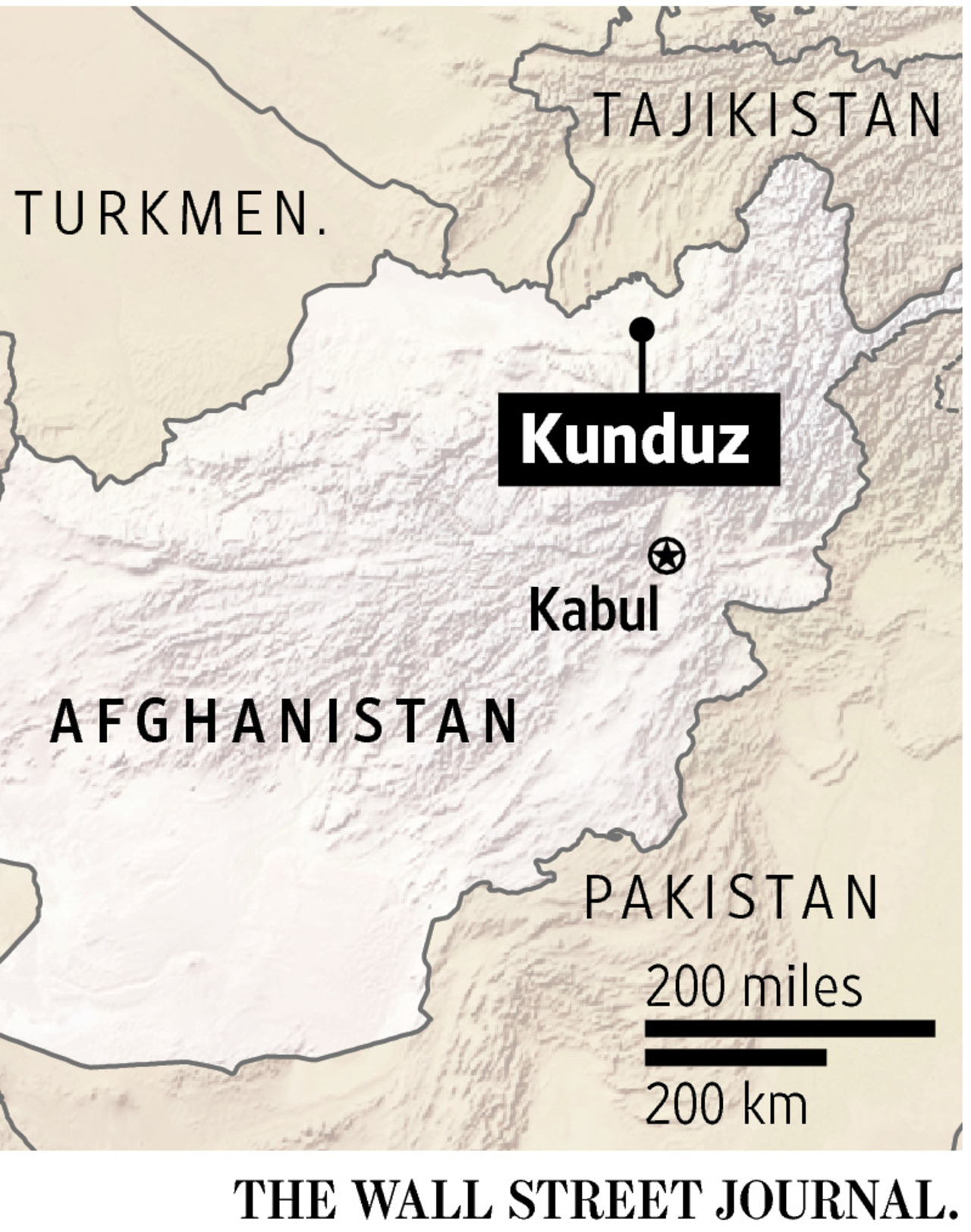http://www.wsj.com/articles/afghan-forces-recapture-kunduz-from-the-taliban-1443678671
Afghan Forces Recapture Central Kunduz From Taliban
Heavy fighting continues in other parts of provincial capital
By Margherita Stancati in Kabul and Habib Khan Totakhil in Kunduz, Afghanistan
Oct. 1, 2015
Afghan troops swept through buildings in central Kunduz searching for insurgents and explosives after recapturing much of the provincial capital from the Taliban early Thursday. But by nightfall, the battle for a city that has come to symbolize the difficulties ahead for the government was far from over.
"It's easy to start a fight but it takes awhile to end it," said army Gen. Murad Ali Murad, who is commanding Afghan troops in Kunduz. "The clearing operation will take awhile."
The Taliban's takeover early this week of Kunduz, a strategically located city of some 300,000 people, was its biggest military victory in 14 years of war, no matter how fleeting.
It revealed the weakness of Afghan troops, despite billions of dollars the U.S. and its coalition partners have spent to train and equip them over the years. And it signaled that Afghan troops may remain more dependent on U.S. air and elite-combat support than both sides have anticipated.
An Afghan army officer who escaped after the Taliban captured the hilltop fortress of Bala Hisar on Wednesday said that many of his comrades, instead of carrying on fighting, removed their uniforms and surrendered. "The main reason for the fall of Bala Hisar to the Taliban was the lack of confidence among our own forces," he said.
The counteroffensive began around 10 p.m. Wednesday, Afghan officials said.
Some 500 Afghan army commandos and police special forces equipped with night-vision goggles and armed with mortars, rocket-propelled grenades and precision rifles, led another 500 Afghan troops into the city from the airport, which was the government's last stronghold. Elsewhere in the city, helicopters hovered as troops descended on ropes.
There was intense fighting throughout the night, and by morning Afghan troops had recaptured key government buildings and were patrolling the streets, according to security officials and residents. Many Taliban retreated and others were killed. Their dead bodies were lying on the road and outside the airport.
The Afghan army extended its counteroffensive in Kunduz province, retaking the districts of Imam Sahib and Chardara, which had fallen to the Taliban on Wednesday, according to Afghan officials.
"Despite strong resistance from the Taliban, Afghan forces defeated them," the Afghan Ministry of Defense announced. Afghanistan's intelligence agency invited journalists to tour the cleared city.
But after an hourslong lull, the fighting resumed as militants repelled government forces from buildings across the city. Journalists weren't allowed into the center of the city. Sporadic fire continued throughout the day and civilians kept to their homes.
"The bazaar is shut and the roads are empty," said a government employee in Kunduz.
The Taliban denied Kunduz had been fully recaptured by government forces. They also made gains elsewhere in the country. Late Thursday the Taliban captured Wardoj district in the northeastern province of Badakhshan, an Afghan security official said.
"It's a strategic district," he said. "Once Wardoj falls, the districts around it are also likely to fall."
The developments complicate Kabul's efforts to strike a peace deal with an emboldened Taliban leadership. Contacts between the warring parties were suspended in July after the revelation that Taliban leader Mullah Mohammad Omar had been dead for over two years.
A person briefed by members of the Taliban leadership said the assault in Kunduz didn't preclude the prospect of resuming peace talks. "They said they don't believe that fighting is the solution. They said that peace is the solution," he said. "There will be fighting alongside peace talks."
When Taliban fighters attacked the city Monday morning, Afghan forces were caught off guard and most retreated to the airport, where they holed up for days.
As the Taliban tightened their grip on Kunduz and closed in on the airport, the U.S. military stepped up its support of its Afghan allies.
About 100 U.S. and coalition special-operations forces were at the airport to advise and assist their local counterparts. Since the fighting began, the U.S. military said there have been six airstrikes on Taliban positions in Kunduz province, many of them in the vicinity of the airport.
Afghan forces took over responsibility for security this year as the U.S. and its coalition partners largely ended their combat role.
The Taliban assault came as U.S. military officials are reviewing options for U.S. troop levels, which under current planning will fall from about 10,000 now to just a few hundred by the end of 2016. The White House said Wednesday that President Barack Obama would weigh conditions on the ground in determining whether to change the timetable for withdrawal.
Defense ministers from the North Atlantic Treaty Organization are set to meet next week for a one-day conference in Brussels. Afghanistan isn't on the formal agenda, but officials said that given recent events, the ministers would discuss the significance of the Taliban attack and the Afghan response.
The NATO assessment is that the Taliban don't have the capability of launching a nationwide offensive and aren't able to directly challenge the central government for control, alliance officials said. Still, according to a senior NATO official, the strike on Kunduz showed that when the Taliban concentrate their forces, they can mount a very significant attack.
--Julian E. Barnes in Brussels contributed to this article.


